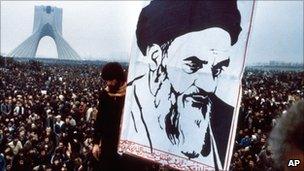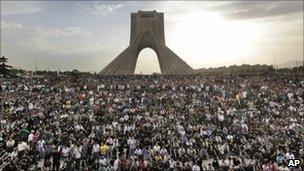Are uprisings a ripple of Iran in 1979?
- Published

Is the religious character of Iran's 1979 revolution echoed in the current protests?
Mass demonstrations in a Muslim country and a secular, Western-backed autocrat in trouble. The regime in Iran believes it has seen this one before.
Iran's rulers have decided that the Arab World in 2011 is following the example set by Iran in 1979 - when the Shah was forced into exile and Ayatollah Khomeini came back to Iran to establish an Islamic Republic.
"The Islamic world is ripe with major new developments and Khomeini's Islam is the engine of these events," writes the conservative Kayhan newspaper.
"The time has come to overcome puppet autocratic regimes by relying on the Islamic teachings," says Ali Larijani, the speaker of Iran's parliament.
The Iranian government wants to project its influence.
For many years the regime has tried to export its particular form of religious government to the wider Middle East. But, with the exception of Hezbollah in southern Lebanon, it has not had much success.
Now the regime in Tehran sees an opportunity following the collapse of the Ben Ali government in Tunisia and the troubles facing Hosni Mubarak in Egypt.
"An Islamic Middle East is being formed," the leading conservative cleric Ahmed Khatami told a Friday prayer gathering in Tehran. "A new Middle East is being shaped around Islam, religion and religious democracy."
Beyond the establishment's confident rhetoric, the case for Iranian influence over the Arab World demonstrations may be much harder to argue. Iran's direct impact in the wider Middle East has always been limited by two historical factors: its people are Persian, not Arab; its branch of Islam is Shia, not Sunni.
In other words, it is hard to have much impact when you speak a different language, have a different culture and profess a rival form of religion from the people you are trying to reach.
Shades of Islam
There has been much speculation about Iran's role in influencing Egypt's main Islamic movement, the Muslim Brotherhood. After all, both believe in the supremacy of Islam over secular politics.
Iran has links with the Palestinian movement Hamas - which is an offshoot of Egypt's Muslim Brotherhood. But the Iranian regime cannot assume that the Muslim Brotherhood itself will look to Tehran for inspiration. Far from it. Some experts believe that it goes the other way.

For some, the current uprisings have more to do with the anti-government protests in Iran last year
"I think the Muslim Brotherhood thinks that it has influence over Iran, not the other way round," says Mehdi Khalaji from the Washington Institute for Near East Policy.
"In terms of ideology it is very self-confident. Its members think it was the Muslim Brotherhood which influenced Iranian clerics to carry out the [Iranian] revolution. Ideologically the Muslim Brotherhood is not influenced by Iran."
And it is worth noting the complexities within the Islamic movements of the Middle East. Alliances between them are not automatic. In 1982, the Syrian army put down a revolt by the Muslim Brotherhood in Syria. Many thousands were killed. Iran's regime took the side of the Syrian government against the Islamists.
"Iran's response to the massacre was to denounce the Muslim Brotherhood 'as a gang carrying out the Camp David conspiracy against Syria'.
A theocratic state ostensibly devoted to propagating its divine message not only stood by as fellow fundamentalists were annihilated but offered words of support to the offending regime as well," writes Ray Takeyh in his book Guardians of the Revolution: Iran and the world in the age of the Ayatollahs.
There is another significant difference between the Arab World demonstrations of 2011 and Iran's revolution of 1979. In Iran, the protesters had a readily identifiable figurehead in Ayatollah Khomeini. Compare this to the semi-leaderless revolts in Tunisia and Egypt.
Some in Iran prefer to point to a different parallel. To those who are able to communicate with the outside world, the link is clear: the Arab World in 2011 is actually a repeat of the mass anti-government protests in Iran following the disputed presidential elections of 2009.
"Our nation deeply respects the glorious uprising of the brave people of Tunisia and that of the people of Egypt, Yemen and other countries in the quest for their rights," the opposition Green Movement leader Mir Hossein Mousavi writes on the Kalameh website.
Another Green Movement supporter posts an update on Facebook: "Let's hope Hosni Mubarak ends like Ben Ali and that the turn of other dictators in the region, including in our country, Iran, comes too. Long live freedom."